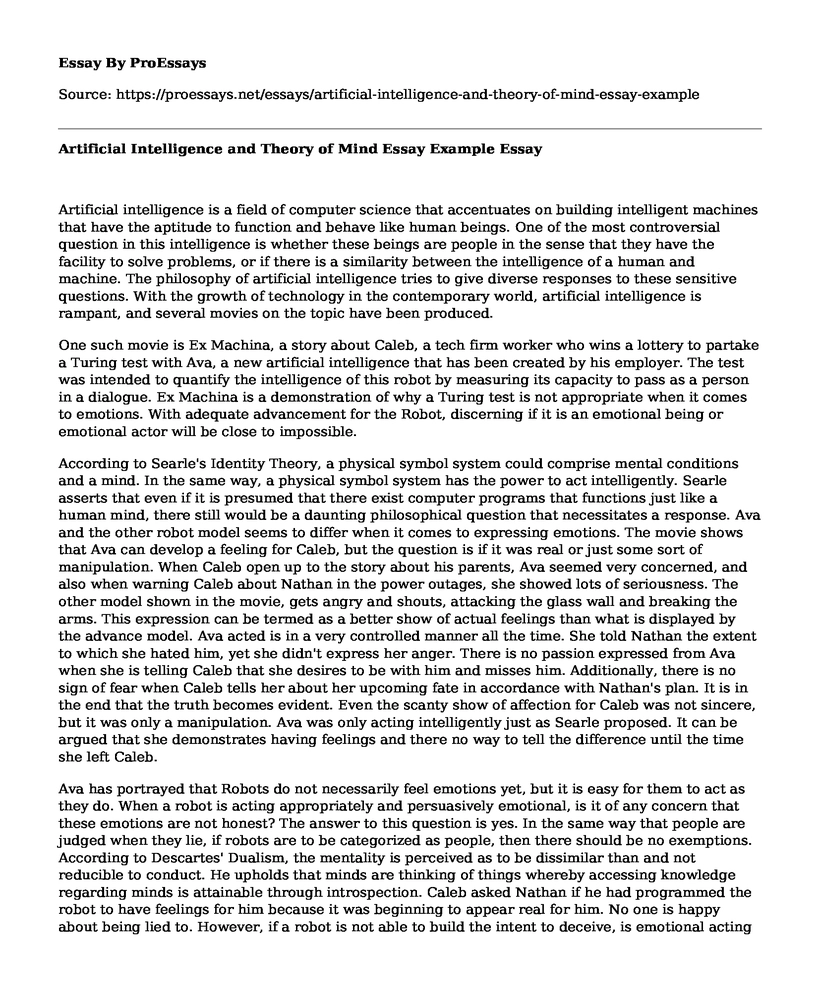Artificial intelligence is a field of computer science that accentuates on building intelligent machines that have the aptitude to function and behave like human beings. One of the most controversial question in this intelligence is whether these beings are people in the sense that they have the facility to solve problems, or if there is a similarity between the intelligence of a human and machine. The philosophy of artificial intelligence tries to give diverse responses to these sensitive questions. With the growth of technology in the contemporary world, artificial intelligence is rampant, and several movies on the topic have been produced.
One such movie is Ex Machina, a story about Caleb, a tech firm worker who wins a lottery to partake a Turing test with Ava, a new artificial intelligence that has been created by his employer. The test was intended to quantify the intelligence of this robot by measuring its capacity to pass as a person in a dialogue. Ex Machina is a demonstration of why a Turing test is not appropriate when it comes to emotions. With adequate advancement for the Robot, discerning if it is an emotional being or emotional actor will be close to impossible.
According to Searle's Identity Theory, a physical symbol system could comprise mental conditions and a mind. In the same way, a physical symbol system has the power to act intelligently. Searle asserts that even if it is presumed that there exist computer programs that functions just like a human mind, there still would be a daunting philosophical question that necessitates a response. Ava and the other robot model seems to differ when it comes to expressing emotions. The movie shows that Ava can develop a feeling for Caleb, but the question is if it was real or just some sort of manipulation. When Caleb open up to the story about his parents, Ava seemed very concerned, and also when warning Caleb about Nathan in the power outages, she showed lots of seriousness. The other model shown in the movie, gets angry and shouts, attacking the glass wall and breaking the arms. This expression can be termed as a better show of actual feelings than what is displayed by the advance model. Ava acted is in a very controlled manner all the time. She told Nathan the extent to which she hated him, yet she didn't express her anger. There is no passion expressed from Ava when she is telling Caleb that she desires to be with him and misses him. Additionally, there is no sign of fear when Caleb tells her about her upcoming fate in accordance with Nathan's plan. It is in the end that the truth becomes evident. Even the scanty show of affection for Caleb was not sincere, but it was only a manipulation. Ava was only acting intelligently just as Searle proposed. It can be argued that she demonstrates having feelings and there no way to tell the difference until the time she left Caleb.
Ava has portrayed that Robots do not necessarily feel emotions yet, but it is easy for them to act as they do. When a robot is acting appropriately and persuasively emotional, is it of any concern that these emotions are not honest? The answer to this question is yes. In the same way that people are judged when they lie, if robots are to be categorized as people, then there should be no exemptions. According to Descartes' Dualism, the mentality is perceived as to be dissimilar than and not reducible to conduct. He upholds that minds are thinking of things whereby accessing knowledge regarding minds is attainable through introspection. Caleb asked Nathan if he had programmed the robot to have feelings for him because it was beginning to appear real for him. No one is happy about being lied to. However, if a robot is not able to build the intent to deceive, is emotional acting a lie? Caleb had bonded to the robot; thus the machine had involuntarily influenced him or instead nurtured narcissism by later permitting his emotional condition to decree an interaction. According to scholars, are not interested in giving sentiments to robots, they only want them to be sensitive to theirs (Chinchole & Patel, 2017).
Conclusion
The theory of mind is necessitated to create artificial intelligence who can act exactly like humans. The approach denotes the capacity to attribute mental conditions like desires, intentions, objectives, and philosophies. It makes it conceivable to comprehend emotions, deduce intents and forecast behavior. An individual's reaction produces the feelings of a robot real. If a robot has an aptitude to make people feel something, then whatever the robot doesn't or does think is debatable. If an advanced and seemingly emotional android smiles at someone or professes its love, is this person able to believe it? It all comes down to what a person chooses. It is hard to prove the emotional condition of Ava, but Caleb trusts that she has feelings even though this belief is based on the prediction.
References
Chinchole, S., & Patel, S. (2017). Artificial intelligence and sensors based assistive system for the visually impaired people. 2017 International Conference on Intelligent Sustainable Systems (ICISS).
Cite this page
Artificial Intelligence and Theory of Mind Essay Example. (2022, Jul 03). Retrieved from https://proessays.net/essays/artificial-intelligence-and-theory-of-mind-essay-example
If you are the original author of this essay and no longer wish to have it published on the ProEssays website, please click below to request its removal:
- First Forward Autobiography. Essay Example on Aging.
- Research Paper on Emotions: Anger vs. Contentment
- Physiological Mechanism Underlying the Stress Symptoms Essay Example
- Research Paper on Biological Methods Used to Treat Schizophrenia
- A Reflection of The Allegory of the Cave
- Ban Cell Phones While Driving: A Necessity Nationwide - Essay Sample
- Essay Sample on Global Strategies: Enhancing Competitive Advantage Across Borders







